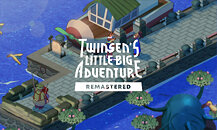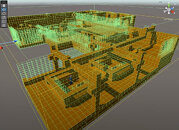T0@st
News Editor
- Joined
- Mar 7, 2023
- Messages
- 2,897 (3.77/day)
- Location
- South East, UK
| System Name | The TPU Typewriter |
|---|---|
| Processor | AMD Ryzen 5 5600 (non-X) |
| Motherboard | GIGABYTE B550M DS3H Micro ATX |
| Cooling | DeepCool AS500 |
| Memory | Kingston Fury Renegade RGB 32 GB (2 x 16 GB) DDR4-3600 CL16 |
| Video Card(s) | PowerColor Radeon RX 7800 XT 16 GB Hellhound OC |
| Storage | Samsung 980 Pro 1 TB M.2-2280 PCIe 4.0 X4 NVME SSD |
| Display(s) | Lenovo Legion Y27q-20 27" QHD IPS monitor |
| Case | GameMax Spark M-ATX (re-badged Jonsbo D30) |
| Audio Device(s) | FiiO K7 Desktop DAC/Amp + Philips Fidelio X3 headphones, or ARTTI T10 Planar IEMs |
| Power Supply | ADATA XPG CORE Reactor 650 W 80+ Gold ATX |
| Mouse | Roccat Kone Pro Air |
| Keyboard | Cooler Master MasterKeys Pro L |
| Software | Windows 10 64-bit Home Edition |
2:21, a French development team is well versed in Unreal Engine 5-based games development—as of last year they were in the process of utilizing Epic's tech to remake Adeline Software's classic duo of Little Big Adventure (1994) and Little Big Adventure 2 (1997), as well as a now cancelled series reboot. Following on from recent-ish good news—regarding a new publication deal—CEO Ben Limare has announced that his team is moving away from UE5: "In June 2023, you experienced an initial prototype on Proxima Island, developed in a short time by a small team. Despite its imperfections, this prototype was a crucial springboard for engaging with you and understanding your expectations. This prototype was built using Unreal Engine 5, with an almost manual reconstruction of the island. Faced with the challenge of replicating this method for a larger world in a limited time, we opted for a complete overhaul of the game, based on new foundations."
Limare revealed to long-term fans that development of "Twinsen's Little Big Adventure" has already quietly transferred over to the Unity Engine—a strange choice given last year's fallout over "Runtime Fees." Unity Technologies is not winning any popularity contests in modern times—CEO John Riccitiello resigned last October, during payment plan upheavals. 2.21 developers did their very best to carry on with UE5, but legacy code demanded a pivot to a compatible foundation. Limare has roped in another Adeline Software veteran: "The answer lies in the work of Sébastien Viannay, a developer on the original games, as well as the mobile port. It was during the work on the latter that Seb developed a small tool to setup the pathfinding—that is, the ability to tap a point on the screen and have Twinsen follow that direction. This tool interprets the original game's data to reconstruct the level and identify obstacles."



He continued with his explanation: "this tool opened a new world for us: using the original game's data in a modern game engine. In practice, all the game logic (quests, dialogues, levels, even animations) is in the form of data. By importing it into a new engine, we can not only faithfully reproduce the game but also reinvent it. The only hiccup in this story? Seb developed this tool on Unity . After attempting to transfer this tool to Unreal, we made the strategic decision to migrate to Unity during last summer." The 2.21 team wants to "preserve the essence and logic of the original game" with LBA 1's transposition into Unity—an upcoming preview article will further discuss the adaption of original scenes, combined with the challenge of preserving geographical continuity. A behind-the-scenes video (watch below) demonstrates how the opening prison scene and a later village setting (on Principal Island) have been recreated.
2.21: " Discover how we build Twinsen's Little Big Adventure with Unity. In the video below, you will discover how the import of a scene from the original game is reproduced in Unity. Please activate subtitles to understand what hides behind the hood."
Discover how we build Twinsen's Little Big Adventure with Unity. In the video below, you will discover how the import of a scene from the original game is reproduced in Unity. Please activate subtitles to understand what hides behind the hood."
"In this video, we are showing the tool we developed to import the data of the original game. We don't use the original textures in the final game. It's only to help us in our development."
View at TechPowerUp Main Site | Source
Limare revealed to long-term fans that development of "Twinsen's Little Big Adventure" has already quietly transferred over to the Unity Engine—a strange choice given last year's fallout over "Runtime Fees." Unity Technologies is not winning any popularity contests in modern times—CEO John Riccitiello resigned last October, during payment plan upheavals. 2.21 developers did their very best to carry on with UE5, but legacy code demanded a pivot to a compatible foundation. Limare has roped in another Adeline Software veteran: "The answer lies in the work of Sébastien Viannay, a developer on the original games, as well as the mobile port. It was during the work on the latter that Seb developed a small tool to setup the pathfinding—that is, the ability to tap a point on the screen and have Twinsen follow that direction. This tool interprets the original game's data to reconstruct the level and identify obstacles."



He continued with his explanation: "this tool opened a new world for us: using the original game's data in a modern game engine. In practice, all the game logic (quests, dialogues, levels, even animations) is in the form of data. By importing it into a new engine, we can not only faithfully reproduce the game but also reinvent it. The only hiccup in this story? Seb developed this tool on Unity . After attempting to transfer this tool to Unreal, we made the strategic decision to migrate to Unity during last summer." The 2.21 team wants to "preserve the essence and logic of the original game" with LBA 1's transposition into Unity—an upcoming preview article will further discuss the adaption of original scenes, combined with the challenge of preserving geographical continuity. A behind-the-scenes video (watch below) demonstrates how the opening prison scene and a later village setting (on Principal Island) have been recreated.
2.21: "
"In this video, we are showing the tool we developed to import the data of the original game. We don't use the original textures in the final game. It's only to help us in our development."
View at TechPowerUp Main Site | Source




